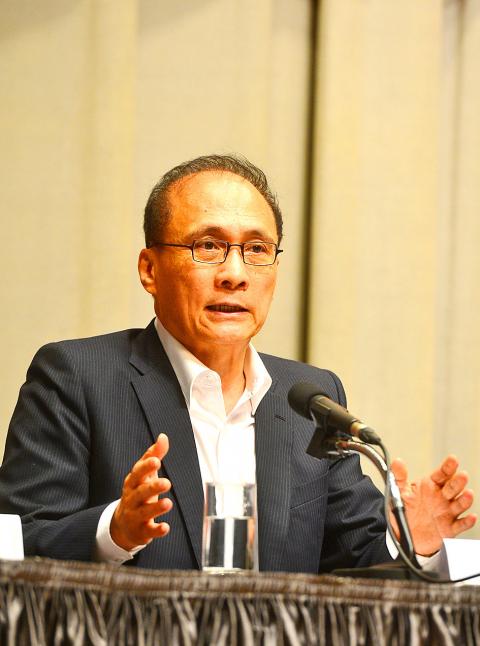The Cabinet yesterday announced strategies to crack down on drug trafficking and rehabilitate drug users, with a four-year, NT$10 billion (US$331 million) budget to combat drug abuse and trafficking.
Premier Lin Chuan (林全) outlined the strategies, saying they would include a scientific approach to trace drug trafficking; the use of advanced drug testing instruments; the establishment of regional rehabilitation centers and personalized rehabilitation programs; and increased penalties for drug dealers.
A database to collate the known associates of drug users and traffickers is to be created using “big data” to help law enforcement personnel predict and track dealers, Lin said.

Photo: Wang Yi-sung, Taipei Times
Rehabilitation centers are to be established in the nation’s north, center, south and east, he said.
The rehabilitation system, which has focused more on correction than medical care, is to be reformed to ensure that offenders will receive treatment, Lin said.
Regulations will be amended to increase penalties for people convicted of selling drugs to underage people and pregnant women, while the penalty for possession of small amounts of Category 3 and Category 4 narcotics will rise, he said.
Currently, people are convicted of possession of a Category 3 or Category 4 drug if they are found with more than 20g, Minister of Justice Chiu Tai-san (邱太三) said.
However, the Cabinet will seek to lower that threshold to 5g, with an amendment to be submitted for review in the next legislative session, Chiu said.
Possession of such substances in quantities below the threshold is punishable by a fine, but is not a criminal offense.
Law enforcement personnel are to be equipped with new testing instruments to crack down on drugs that are mixtures of substances.
“We hope to see results [from the strategies] by 2020, with the expectation being that there will be a drop in the number of new drug users and crimes associated with drug abuse,” Lin said.
The NT$10 billion is to be invested in drug prevention programs from this year through 2020.
Currently, the annual budget is NT$1.2 billion.
About 230,000 people, or 1.29 percent of the population, have a history of substance abuse, while 48 percent of the nation’s 27,000 inmates are incarcerated for drug-related crimes, government statistics showed.
Last year, 60,756 people were arrested for illicit drug use, while 11,081 were investigated on suspicion of drug trafficking, statistics showed.
Category 3 narcotics, such as Ketamine, are the most abused substances among students, with 7,962 such cases reported in the past five years, statistics showed.
However, that number is considered to be far less than the number of teenagers with drug abuse issues.
Smuggling accounts for the majority of the illegal drugs in Taiwan.
From May last year to February, 35 percent of prohibited substances discovered by law enforcement were sourced in Hong Kong, while 31 percent were from China, the statistics showed.

Conflict with Taiwan could leave China with “massive economic disruption, catastrophic military losses, significant social unrest, and devastating sanctions,” a US think tank said in a report released on Monday. The German Marshall Fund released a report titled If China Attacks Taiwan: The Consequences for China of “Minor Conflict” and “Major War” Scenarios. The report details the “massive” economic, military, social and international costs to China in the event of a minor conflict or major war with Taiwan, estimating that the Chinese People’s Liberation Army (PLA) could sustain losses of more than half of its active-duty ground forces, including 100,000 troops. Understanding Chinese

The Ministry of Foreign Affairs (MOFA) yesterday said it is closely monitoring developments in Venezuela, and would continue to cooperate with democratic allies and work together for regional and global security, stability, and prosperity. The remarks came after the US on Saturday launched a series of airstrikes in Venezuela and kidnapped Venezuelan President Nicolas Maduro, who was later flown to New York along with his wife. The pair face US charges related to drug trafficking and alleged cooperation with gangs designated as terrorist organizations. Maduro has denied the allegations. The ministry said that it is closely monitoring the political and economic situation

UNRELENTING: China attempted cyberattacks on Taiwan’s critical infrastructure 2.63 million times per day last year, up from 1.23 million in 2023, the NSB said China’s cyberarmy has long engaged in cyberattacks against Taiwan’s critical infrastructure, employing diverse and evolving tactics, the National Security Bureau (NSB) said yesterday, adding that cyberattacks on critical energy infrastructure last year increased 10-fold compared with the previous year. The NSB yesterday released a report titled Analysis on China’s Cyber Threats to Taiwan’s Critical Infrastructure in 2025, outlining the number of cyberattacks, major tactics and hacker groups. Taiwan’s national intelligence community identified a large number of cybersecurity incidents last year, the bureau said in a statement. China’s cyberarmy last year launched an average of 2.63 million intrusion attempts per day targeting Taiwan’s critical

‘SLICING METHOD’: In the event of a blockade, the China Coast Guard would intercept Taiwanese ships while its navy would seek to deter foreign intervention China’s military drills around Taiwan this week signaled potential strategies to cut the nation off from energy supplies and foreign military assistance, a US think tank report said. The Chinese People’s Liberation Army (PLA) conducted what it called “Justice Mission 2025” exercises from Monday to Tuesday in five maritime zones and airspace around Taiwan, calling them a warning to “Taiwanese independence” forces. In a report released on Wednesday, the Institute for the Study of War said the exercises effectively simulated blocking shipping routes to major port cities, including Kaohsiung, Keelung and Hualien. Taiwan would be highly vulnerable under such a blockade, because it